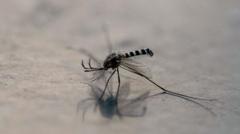In response to an alarming increase in dengue fever cases, a densely populated community in Manila, Philippines, has taken proactive measures by implementing a mosquito bounty program. Carlito Cernal, the local village chief of Barangay Addition Hills, has initiated a program that rewards residents with one peso (approximately two US cents) for every five mosquitoes they capture, either dead or alive, in an effort to curb the spread of the disease. The innovative initiative follows the heartbreaking deaths of two students from the neighborhood due to dengue, highlighting the urgency of the situation.
Philippine Community Launches Innovative Mosquito Bounty Program Amid Dengue Surge

Philippine Community Launches Innovative Mosquito Bounty Program Amid Dengue Surge
A Manila neighborhood introduces a unique approach to combat rising dengue cases by incentivizing mosquito collection.
Despite facing ridicule on social media, with comments mocking mosquito "farming," Cernal maintains that the initiative is vital for community health. "We have to do something to help the local government," he noted, pointing out that the area has reported 44 dengue cases amid a national surge. The program, lasting a month, complements existing efforts to control mosquito populations, including cleaning public spaces and eliminating standing water where mosquitoes breed.
So far, the community’s efforts have seen 21 participants bringing in approximately 700 mosquitoes and their larvae. The Department of Health of the Philippines acknowledged the local government’s intentions but suggested that evidence-based practices be prioritized to combat dengue effectively. Dengue fever remains a significant health threat, characterized by severe symptoms and potentially life-threatening consequences.
As heavy seasonal rains contribute to an upswing in cases, health authorities have urged the public to maintain cleanliness in their surroundings, eliminate breeding sites, wear protective clothing, and use mosquito repellents. Moreover, the recent rain not only escalated dengue cases but also led to increased instances of other diseases, prompting a broader public health response in the region.
So far, the community’s efforts have seen 21 participants bringing in approximately 700 mosquitoes and their larvae. The Department of Health of the Philippines acknowledged the local government’s intentions but suggested that evidence-based practices be prioritized to combat dengue effectively. Dengue fever remains a significant health threat, characterized by severe symptoms and potentially life-threatening consequences.
As heavy seasonal rains contribute to an upswing in cases, health authorities have urged the public to maintain cleanliness in their surroundings, eliminate breeding sites, wear protective clothing, and use mosquito repellents. Moreover, the recent rain not only escalated dengue cases but also led to increased instances of other diseases, prompting a broader public health response in the region.





















